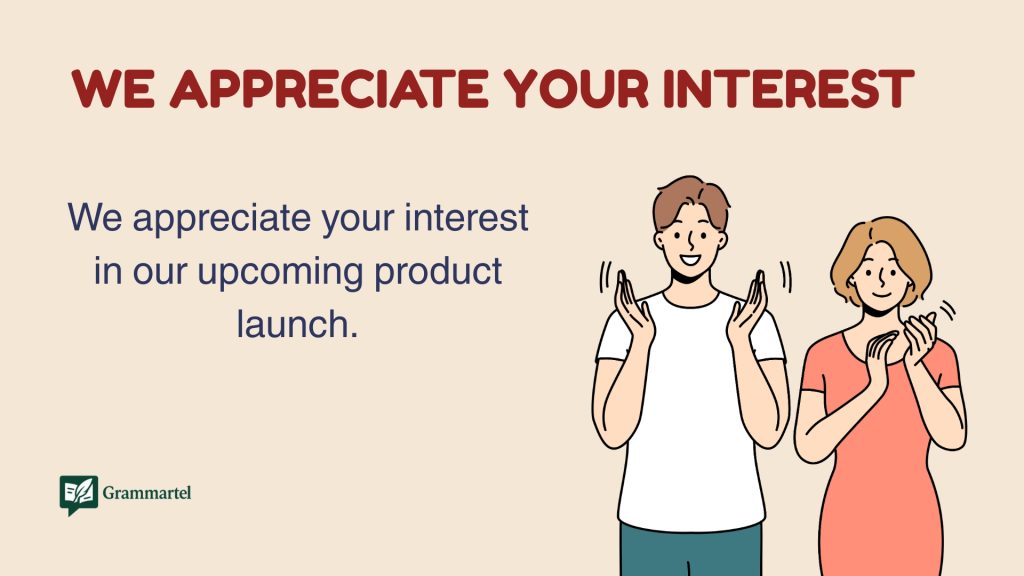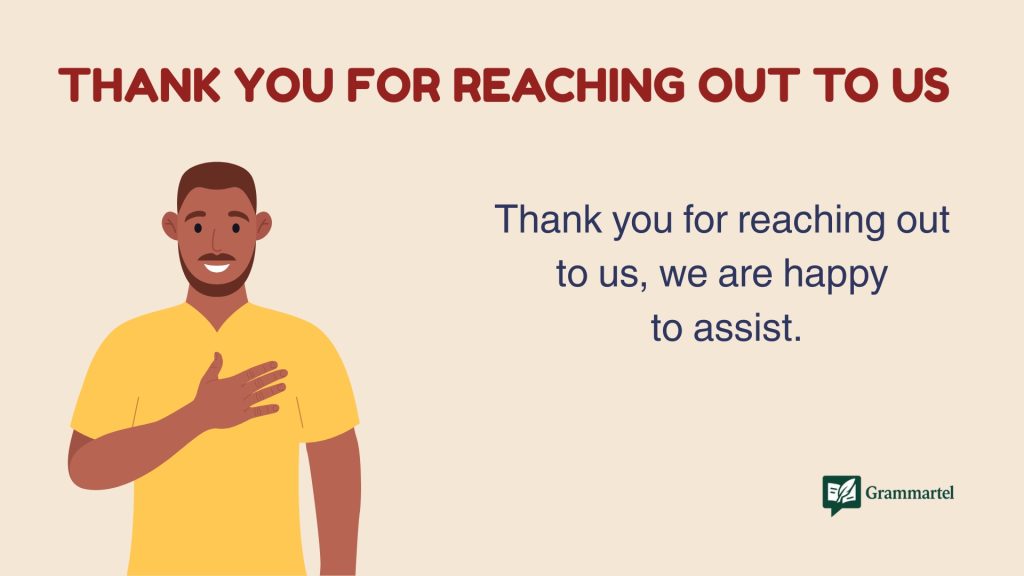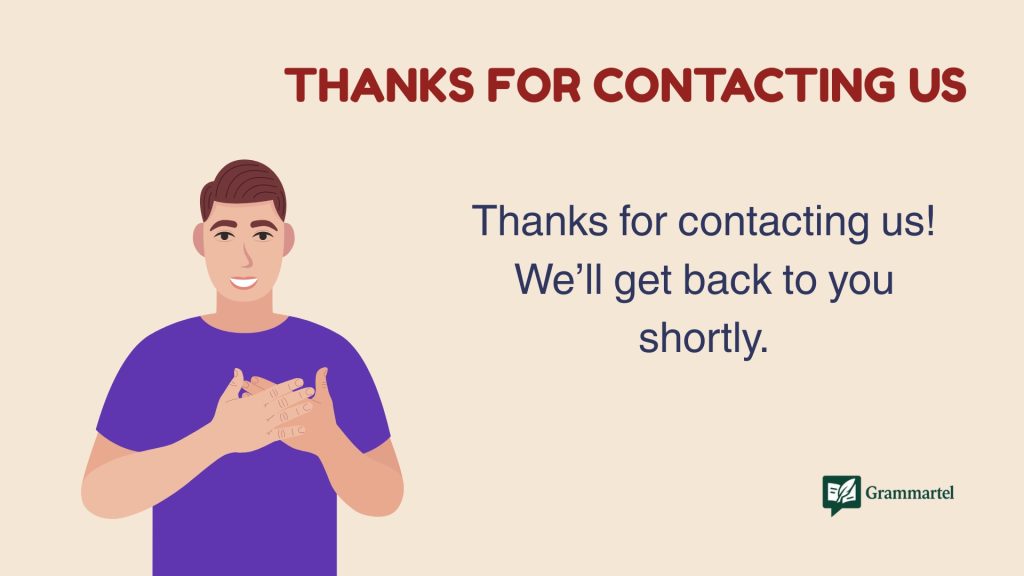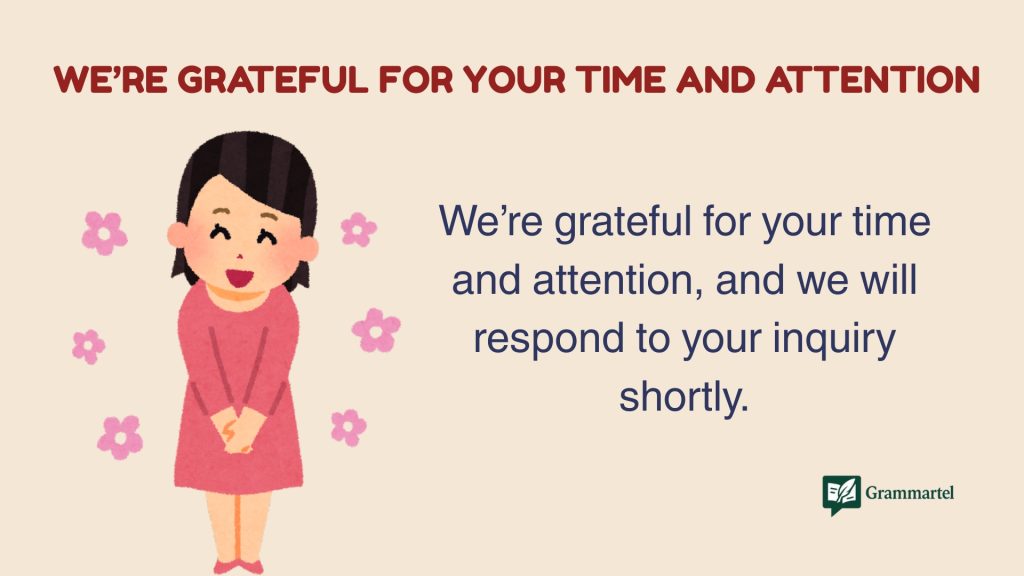When someone reaches out to you, acknowledging their inquiry is an important step in maintaining good communication. While “Thank you for your inquiry” is a common response, it’s helpful to have different ways to express your appreciation. Varying your language not only keeps your messages fresh but also shows that you value the person’s interest. In this article, we’ll explore 40 alternative ways to say “Thank you for your inquiry,” with examples for each.
What Does “Thank You for Your Inquiry” Mean?
“Thank you for your inquiry” is a polite way to acknowledge someone’s request for information. It shows appreciation for their interest or questions. Often used in emails or customer service, this phrase expresses gratitude and signals that the person’s query is being taken seriously.
When to Use “Thank You for Your Inquiry”
Use “Thank you for your inquiry” when responding to someone’s request for information or when they ask questions. It is common in professional settings, like businesses or customer support. This phrase helps start a conversation politely and sets a positive tone for further communication.
40 Other Ways to Say “Thank You for Your Inquiry”
1. We Appreciate Your Interest

- Meaning: Expresses gratitude for someone’s interest in your product or service.
- Explanation: Acknowledges the time and effort someone put into showing interest.
- Example: “We appreciate your interest in our upcoming product launch.”
- Best Use: When responding to someone who has shown interest but may not have committed to anything yet.
- Worst Use: In situations where you’re responding to a formal request or serious inquiry.
- Tone: Grateful, warm
2. Thank You for Reaching Out
- Meaning: Acknowledge the act of contacting or getting in touch.
- Explanation: Expresses thanks for initiating contact.
- Example: “Thank you for reaching out to us. How can we assist you today?”
- Best Use: When someone has contacted you for the first time.
- Worst Use: When the inquiry involves a complicated or critical issue.
- Tone: Friendly, professional
3. Thank You for Your Message
- Meaning: Shows appreciation for receiving a message.
- Explanation: A general, polite acknowledgment of a message received.
- Example: “Thank you for your message. We will get back to you shortly.”
- Best Use: When responding to a casual email or inquiry.
- Worst Use: When dealing with high-stakes or urgent inquiries.
- Tone: Neutral, polite
4. We’re Grateful for Your Inquiry
- Meaning: A polite expression of gratitude.
- Explanation: More formal than “thank you,” showing deep appreciation.
- Example: “We’re grateful for your inquiry regarding our services.”
- Best Use: In formal business settings.
- Worst Use: When you want a more casual or friendly tone.
- Tone: Formal, appreciative
5. Thanks for Reaching Out to Us
- Meaning: Expresses thanks for contacting you.
- Explanation: Similar to “Thank you for reaching out,” but with a slightly more relaxed tone.
- Example: “Thanks for reaching out to us, we are happy to help.”
- Best Use: Informal or semi-formal settings.
- Worst Use: In a highly formal communication.
- Tone: Casual, friendly
6. Thank You for Getting in Touch
- Meaning: Acknowledges the effort to contact you.
- Explanation: A polite, neutral way of recognizing someone’s effort to reach out.
- Example: “Thank you for getting in touch. We’ll reply shortly.”
- Best Use: When replying to general inquiries.
- Worst Use: When responding to a time-sensitive request.
- Tone: Warm, neutral
7. We Appreciate You Reaching Out
- Meaning: Expresses thanks for someone contacting you.
- Explanation: Conveys genuine gratitude for the effort.
- Example: “We appreciate you reaching out and look forward to assisting you.”
- Best Use: When responding to a customer request or question.
- Worst Use: In highly formal or legal contexts.
- Tone: Friendly, warm
8. Thank You for Your Interest in Our Services
- Meaning: Acknowledges someone’s interest in what you offer.
- Explanation: More specific than a general inquiry, particularly in service industries.
- Example: “Thank you for your interest in our services. How can we assist you?”
- Best Use: When responding to an inquiry regarding your services.
- Worst Use: When the inquiry is not about your services specifically.
- Tone: Professional, polite
9. We’re Excited to Hear From You
- Meaning: Expresses enthusiasm about the communication.
- Explanation: More energetic and upbeat than a typical “thank you.”
- Example: “We’re excited to hear from you and will respond soon!”
- Best Use: When dealing with enthusiastic clients or inquiries that align with your offerings.
- Worst Use: In serious, formal inquiries.
- Tone: Energetic, friendly
10. Thank You for Your Request
- Meaning: Acknowledges a request or need.
- Explanation: A polite way to recognize that you’ve received a specific request.
- Example: “Thank you for your request. We will process it shortly.”
- Best Use: When someone asks for specific information or assistance.
- Worst Use: When someone is simply inquiring without making a formal request.
- Tone: Formal, appreciative
11. Thank You for Your Query
- Meaning: A formal acknowledgment of an inquiry.
- Explanation: Used when someone asks a question or clarifies something.
- Example: “Thank you for your query regarding our product line.”
- Best Use: When responding to a formal or detailed question.
- Worst Use: In a casual or informal communication.
- Tone: Professional, formal
12. We’re Grateful for Your Interest
- Meaning: Shows appreciation for someone’s curiosity or interest in what you offer.
- Explanation: A warm and formal way of thanking someone for showing interest.
- Example: “We’re grateful for your interest in our offerings. Please feel free to ask any questions.”
- Best Use: In a sales or marketing context.
- Worst Use: When someone has already made a purchase or formal decision.
- Tone: Polite, professional
Have a look at : 40 Other Ways to Say “What Are the Next Steps?” (With Examples).
13. Thank You for Reaching Out to Us

- Meaning: Polite acknowledgment of someone contacting you.
- Explanation: Similar to “thank you for getting in touch.”
- Example: “Thank you for reaching out to us, we are happy to assist.”
- Best Use: When replying to general inquiries.
- Worst Use: In highly technical or urgent situations.
- Tone: Neutral, polite
14. Thank You for Connecting With Us
- Meaning: Acknowledges that communication has been initiated.
- Explanation: More informal but still polite.
- Example: “Thank you for connecting with us. How may we assist?”
- Best Use: When dealing with new customers or contacts.
- Worst Use: When responding to critical inquiries.
- Tone: Friendly, approachable
15. Thanks for Your Inquiry
- Meaning: Simple, straightforward acknowledgment of an inquiry.
- Explanation: Casual but polite.
- Example: “Thanks for your inquiry. We will follow up with details shortly.”
- Best Use: In informal or semi-formal communication.
- Worst Use: In formal business communications.
- Tone: Casual, friendly
16. We Appreciate Your Time
- Meaning: Acknowledges the effort someone put into asking or investigating.
- Explanation: Expresses gratitude for the time spent making an inquiry.
- Example: “We appreciate your time and will get back to you with more information soon.”
- Best Use: When the inquiry requires time or effort on the part of the inquirer.
- Worst Use: In response to a brief or simple question.
- Tone: Grateful, professional
17. It’s a Pleasure to Hear From You
- Meaning: Expresses that you’re happy someone reached out.
- Explanation: More personal and less formal.
- Example: “It’s a pleasure to hear from you. How can we assist?”
- Best Use: When responding to a friendly or casual inquiry.
- Worst Use: When the inquiry is formal or urgent.
- Tone: Warm, friendly
18. We’re Thankful for Your Interest
- Meaning: Formal expression of gratitude for showing interest.
- Explanation: More formal than “thanks for reaching out.”
- Example: “We’re thankful for your interest and will be in touch shortly.”
- Best Use: Formal business interactions or professional settings.
- Worst Use: Casual interactions or informal communication.
- Tone: Grateful, formal
19. Thank You for Getting in Touch
- Meaning: Acknowledge that someone has made contact.
- Explanation: Expresses gratitude in a neutral manner.
- Example: “Thank you for getting in touch with us, we will respond soon.”
- Best Use: Casual business settings or customer inquiries.
- Worst Use: High-level business communications.
- Tone: Neutral, polite
20. Thank You for Your Consideration
- Meaning: Acknowledges the time spent considering your product or service.
- Explanation: Used when someone is evaluating your offering.
- Example: “Thank you for your consideration, and please let us know if you have further questions.”
- Best Use: When responding to someone evaluating your product or service.
- Worst Use: When someone is just making a simple inquiry.
- Tone: Formal, respectful
21. Thanks for Taking the Time to Inquire
- Meaning: Acknowledges the effort someone took to inquire.
- Explanation: A polite and respectful way to thank someone for their time.
- Example: “Thanks for taking the time to inquire, we’ll provide more information shortly.”
- Best Use: When responding to thoughtful or in-depth inquiries.
- Worst Use: For casual, quick questions.
- Tone: Respectful, appreciative
22. We’re Happy to Assist
- Meaning: Conveys readiness to help and appreciation for the inquiry.
- Explanation: Indicates that you are willing and ready to support the person’s needs.
- Example: “We’re happy to assist you with your inquiry. Let us know how we can help.”
- Best Use: Customer service and support inquiries.
- Worst Use: In a highly formal or corporate context.
- Tone: Friendly, helpful
23. Thank You for Your Query
- Meaning: Acknowledges a question or request.
- Explanation: Formal way of recognizing a request for information.
- Example: “Thank you for your query regarding our products.”
- Best Use: For formal or detailed questions.
- Worst Use: Casual inquiries or requests.
- Tone: Formal, respectful
24. We’re Delighted to Hear From You
- Meaning: Expresses joy at receiving the inquiry.
- Explanation: A warmer, more personal way to acknowledge contact.
- Example: “We’re delighted to hear from you and are happy to assist with your needs.”
- Best Use: When responding to enthusiastic or warm inquiries.
- Worst Use: When the inquiry is formal or serious.
- Tone: Friendly, cheerful
25. Thanks for Contacting Us

- Meaning: A simple acknowledgment of contact.
- Explanation: Casual and neutral in tone, thanking the person for reaching out.
- Example: “Thanks for contacting us! We’ll get back to you shortly.”
- Best Use: For informal customer or client inquiries.
- Worst Use: For formal or high-stakes communications.
- Tone: Casual, polite
26. We Appreciate Your Engagement
- Meaning: Acknowledges that someone took the initiative to engage with you.
- Explanation: Can be used for both questions and comments.
- Example: “We appreciate your engagement with our brand and will respond soon.”
- Best Use: When someone has interacted with your brand in a meaningful way.
- Worst Use: For basic inquiries without much engagement.
- Tone: Respectful, professional
27. Thank You for Your Communication
- Meaning: Formal acknowledgment of a message.
- Explanation: Used when replying to a more serious or formal inquiry.
- Example: “Thank you for your communication, we will be in touch shortly.”
- Best Use: In legal, corporate, or formal settings.
- Worst Use: In casual interactions.
- Tone: Formal, businesslike
28. Thank You for the Opportunity to Help
- Meaning: Shows appreciation for being chosen to provide assistance.
- Explanation: Used when responding to someone seeking help or advice.
- Example: “Thank you for the opportunity to help you with your project.”
- Best Use: In service-oriented industries.
- Worst Use: When there is no specific help being requested.
- Tone: Grateful, professional
29. We’re Thankful for Your Inquiry
- Meaning: Expresses gratitude for receiving an inquiry.
- Explanation: A polite and formal way to acknowledge someone’s request or question.
- Example: “We’re thankful for your inquiry and will respond to it promptly.”
- Best Use: In formal or business communication.
- Worst Use: In informal or casual settings.
- Tone: Formal, appreciative
30. Thank You for Taking the Step to Reach Out
- Meaning: Acknowledges that the person made the effort to contact you.
- Explanation: Conveys appreciation for the initiative taken.
- Example: “Thank you for taking the step to reach out. We are happy to assist.”
- Best Use: When a person reaches out for the first time.
- Worst Use: For repeated or routine inquiries.
- Tone: Warm, encouraging
31. We Appreciate Your Feedback
- Meaning: Shows gratitude for feedback or questions.
- Explanation: Used when the inquiry is related to feedback or suggestions.
- Example: “We appreciate your feedback and will take it into account.”
- Best Use: When responding to suggestions, comments, or feedback.
- Worst Use: When there is no feedback or suggestion involved.
- Tone: Appreciative, professional
32. Thanks for Your Request for Information
- Meaning: Acknowledges a request for detailed information.
- Explanation: Useful when someone asks for specific details or clarification.
- Example: “Thanks for your request for information. We’ll send you the details shortly.”
- Best Use: In customer service or when providing detailed information.
- Worst Use: When no specific request for information was made.
- Tone: Polite, informative
33. Thank You for Reaching Out with Your Question
- Meaning: Polite acknowledgment of a question asked.
- Explanation: Emphasizes that the inquiry is valued.
- Example: “Thank you for reaching out with your question. We’ll get back to you soon.”
- Best Use: In customer support or casual inquiries.
- Worst Use: When the question is more complex and requires a detailed response.
- Tone: Friendly, casual
34. We’re Glad to Hear from You
- Meaning: Expresses happiness about the person getting in touch.
- Explanation: A friendly, positive way to acknowledge an inquiry.
- Example: “We’re glad to hear from you! Let us know how we can assist.”
- Best Use: When the inquiry feels like a positive opportunity.
- Worst Use: For formal, professional inquiries.
- Tone: Positive, upbeat
35. Thank You for Your Consideration of Our Offer
- Meaning: Acknowledges that someone is evaluating your offer.
- Explanation: Expresses appreciation when someone is considering a business proposal.
- Example: “Thank you for your consideration of our offer. Please don’t hesitate to reach out with any questions.”
- Best Use: In sales or business contexts.
- Worst Use: When the inquiry is unrelated to an offer or proposal.
- Tone: Formal, respectful
36. We Appreciate Your Inquiry and Look Forward to Working Together
- Meaning: Acknowledges the inquiry and expresses a desire to collaborate.
- Explanation: Used in a more collaborative or partnership-driven context.
- Example: “We appreciate your inquiry and look forward to working together on this project.”
- Best Use: In partnership or collaboration scenarios.
- Worst Use: For one-off inquiries with no long-term engagement.
- Tone: Professional, optimistic
37. Thank You for Your Consideration of Our Services
- Meaning: Acknowledges that someone is evaluating your services.
- Explanation: Formal way of expressing appreciation when someone is considering your business services.
- Example: “Thank you for your consideration of our services. Please let us know if you need more details.”
- Best Use: In response to a service-based inquiry.
- Worst Use: For inquiries unrelated to service offerings.
- Tone: Formal, polite
Also Read : 40 Polite Alternatives to “I’m Sorry You Feel That Way” (With Real Examples).
38. We’re Grateful for Your Time and Attention

- Meaning: Acknowledges that the person has devoted time to inquire.
- Explanation: A respectful and formal way to thank someone.
- Example: “We’re grateful for your time and attention, and we will respond to your inquiry shortly.”
- Best Use: For formal or business-related inquiries.
- Worst Use: In informal settings or casual communications.
- Tone: Grateful, respectful
39. Thanks for Asking
- Meaning: Simple, casual acknowledgment for asking a question.
- Explanation: Informal way of expressing gratitude for a question.
- Example: “Thanks for asking, I’ll provide the information you need.”
- Best Use: In casual or friendly interactions.
- Worst Use: When the inquiry is formal or complex.
- Tone: Casual, friendly
40. We Appreciate Your Interest in Learning More
- Meaning: Acknowledges someone’s desire to explore further.
- Explanation: Used when the inquiry is about learning more about your services or products.
- Example: “We appreciate your interest in learning more about our product range.”
- Best Use: When someone wants further details about your offerings.
- Worst Use: For simple or unrelated inquiries.
- Tone: Professional, appreciative
Conclusion
Having different ways to say “Thank you for your inquiry” can help keep your communication polite and professional. By using these alternatives, you can sound more engaging and thoughtful. Whether in emails or customer service, these variations can help you express gratitude in a more personal way, making your responses feel more sincere and meaningful.
Unlock your potential by using Grammartel platform to stay sharp.

